Call Us 440.951.1008
Dental Implants
What are dental implants?

Single tooth replaced by a single dental implant
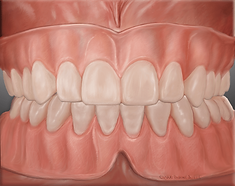
Dentures placed over implants to replace all a patient's missing teeth.
A dental implant is an artificial tooth root placed into your jaw to hold a replacement tooth or bridge in place. While high-tech in nature, dental implants are actually more tooth-saving than traditional bridgework, since implants do not rely on using neighboring teeth as “anchors” for support.
Dental implants are natural in look and feel, so you may forget you ever lost a tooth.
What can dental implants do for me?
-
Replace one or more teeth without affecting bordering teeth.
-
Support a bridge and eliminate the need for a removable partial denture.
-
Provide support for a denture, making it more secure and comfortable.



Advantages of dental implants
Reliable- The success rate of dental implants is highly predictable. They are considered an excellent option for tooth replacement. Dental implants never decay.
Esthetic- Dental implants don’t sacrifice the quality of your adjacent teeth like a bridge does because neighboring teeth are not altered to support the implant. More of your own teeth are left untouched, a significant long-term benefit to your oral health.
Confidence- Dental implants will allow you to once again speak and eat with comfort and confidence! They are secure and offer freedom from the instability of dentures. They will allow you to say goodbye to worries about misplaced dentures and messy pastes and glues.
Am I a candidate for dental implants?
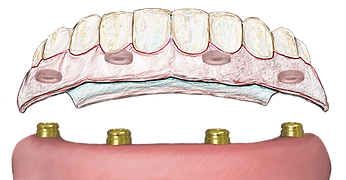
Dental implants can support a full denture - making it feel safe and secure. This allows a person to smile and chew with confidence.
The ideal candidate for a dental implant is in good general and oral health. Adequate bone in your jaw is needed to support the implant, and the best candidates have healthy gum tissues that are free of periodontal disease.
Dental implants are intimately connected with the gum tissues and underlying bone in the mouth. Since periodontists are the dental experts who specialize in precisely these areas, they are ideal members of your dental implant team. Not only does Dr. Batos have experience working with other dental professionals, she also has the special knowledge, training and facilities that you need to have teeth that look and feel just like your own.
What is treatment like?
Local anesthesia and sedation are used to help ensure patient comfort during the treatment.
The first step is placing the implants. After this surgical treatment, the bone in the jaw attaches to the implants, holding them firmly in place. The attachment of bone to the implant is called osseointegration.
As a second step, replacement teeth are created and securely attached to the implants. The replacement teeth feel like your own.
After treatment is completed, brushing, flossing and visiting your dentist regularly are essential to the success of the implant.
What are bone grafting and GBR?
Bone grafting is a surgical procedure that replaces missing bone with a material called a bone graft. This material not only replaces missing bone, but also helps your body regrow lost bone. This new bone growth strengthens the grafted area by forming a bridge between your existing bone and graft. Over time the newly formed bone will replace much of the grafted material. GBR is a procedure in which a membrane is placed over the bone graft site. This membrane further encourages new bone to grow and also prevents the growth of scar tissue into the grafted site.
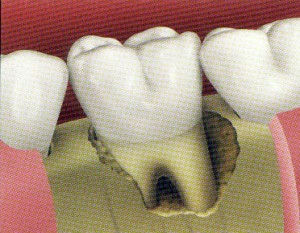
Periodontal defects
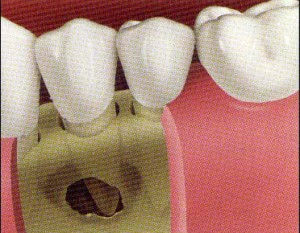
Defects following cyst or tumor surgery
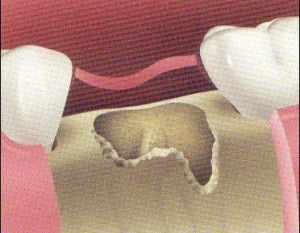
Defects following tooth extraction
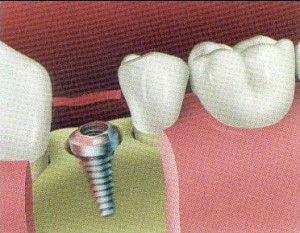
Defects around dental implants
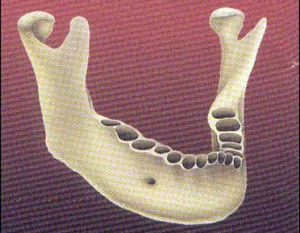
Normal
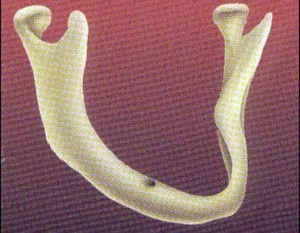
Deficient
What can I expect after treatment?
As you know, your own teeth require conscientious at home oral care and regular dental visits. Dental implants are like your own teeth and will require the same care. In order to keep your implant clean and plaque free, brushing and flossing still apply.
After treatment, your periodontist will work closely with you and your dentist to develop the best care plan for you. Periodic follow-up visits will be scheduled to monitor your implant, teeth and gums to make sure they are healthy.

